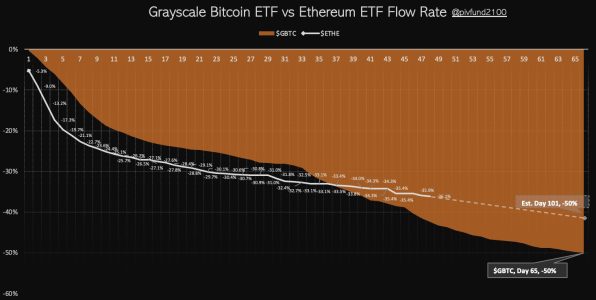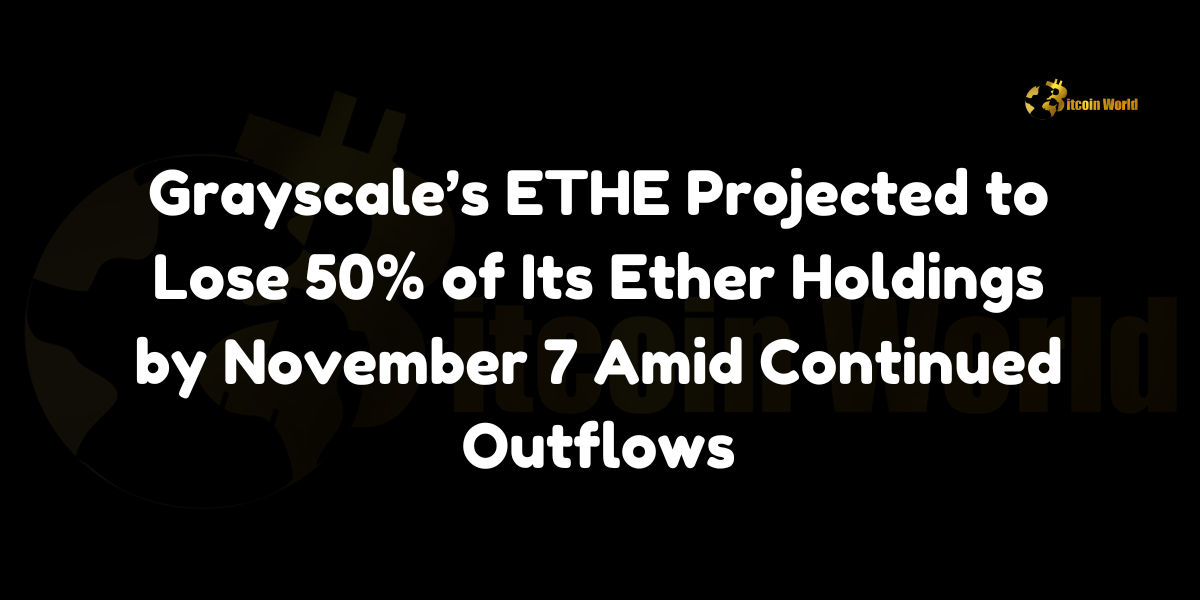Grayscale’s ETHE Projected to Lose 50% of Its Ether Holdings by November 7 Amid Continued Outflows
Grayscale’s spot Ether ETF (ETHE) has seen significant outflows since its launch, with a new projection estimating that 50% of the Ether held by the ETF could be withdrawn by November 7, 2024. According to Trader T, a respected cryptocurrency analyst on X (formerly Twitter), Grayscale’s ETHE experienced a net outflow of $10.72 million on September 27, which marks 36.1% of the Ether under management being withdrawn over the past 48 trading days.
If this trend continues, it is estimated that by November 7, ETHE could see 50% of its total Ether holdings withdrawn, just 101 trading days since the ETF’s inception. This projection raises concerns about the performance and long-term stability of Grayscale’s Ether ETF, especially in light of the broader market trends affecting Ethereum (ETH).

Recent Outflows in Grayscale’s ETHE
Grayscale’s ETHE fund was launched to provide investors with a regulated investment vehicle for direct exposure to Ethereum, without the complexities of self-custody or engaging with decentralized exchanges. However, since its launch, the ETF has seen consistent outflows, with many investors opting to withdraw their holdings.
On September 27, ETHE experienced a net outflow of $10.72 million, which significantly impacted the total amount of Ether held under the fund’s management. This outflow reflects broader trends in the cryptocurrency market, as Ethereum’s price volatility, combined with regulatory uncertainty, has led some investors to reconsider their positions in Ether-based ETFs.
According to Trader T, this trend could lead to a significant reduction in the fund’s total Ether reserves. As of now, 36.1% of the Ether initially managed by the ETF has already been withdrawn, and if the current rate of withdrawals continues, the fund could lose 50% of its Ether holdings by November 7.
What’s Driving the Outflows?
The continued outflows from Grayscale’s ETHE may be driven by several factors affecting both Ethereum and the broader crypto market:
- Ethereum Price Volatility: Ether (ETH), like other major cryptocurrencies, has experienced price fluctuations over recent months. Some investors, wary of the volatility and uncertain market conditions, may have opted to exit their positions to lock in gains or minimize potential losses.
- Regulatory Uncertainty: While Grayscale’s ETHE offers a regulated option for investing in Ethereum, the regulatory landscape surrounding cryptocurrencies remains unclear in many jurisdictions. Ongoing SEC scrutiny of cryptocurrency-related investment products, as well as delays in the approval of spot Bitcoin ETFs and Ether ETF options, have contributed to investor anxiety.
- Market Sentiment: Ethereum’s performance in the current market cycle has fallen short of investor expectations, particularly after the delays in key network upgrades and the slower-than-expected adoption of Ethereum 2.0 staking. This has led to a cautious sentiment among traders and investors, prompting some to exit Ether-based investment products.
- Shift to Other Investment Vehicles: Some investors may be reallocating their funds to other crypto investment vehicles, such as Bitcoin ETFs, which have seen significant inflows recently. Additionally, investors may prefer decentralized finance (DeFi) protocols, where they can stake their Ether for potentially higher returns compared to holding through an ETF.
Implications for Grayscale’s ETHE and the Market
The potential for Grayscale’s ETHE to lose 50% of its Ether holdings by November 7 could have far-reaching implications, not only for the ETF itself but also for the broader Ethereum ecosystem. The outflows signal a lack of investor confidence in the short-term performance of Ethereum, especially amid ongoing market fluctuations.
Here are some possible implications of the continued outflows:
- Impact on Grayscale’s Reputation: Grayscale has long been seen as a leader in providing institutional-grade crypto investment products. However, the ongoing outflows from its ETHE fund may challenge its reputation, particularly if investors view this as a sign of declining interest in Ethereum-based ETFs.
- Ethereum’s Market Dynamics: If Grayscale continues to liquidate Ether to fulfill investor withdrawals, this could create downward pressure on the price of ETH, especially if the withdrawals coincide with other macro-economic factors influencing the cryptocurrency market.
- Potential for a Rebound: Despite the outflows, some analysts believe that ETHE could experience a rebound if Ethereum’s price stabilizes or shows signs of a bullish recovery. Additionally, if regulatory clarity improves and Ethereum’s network upgrades proceed as planned, investor confidence in the ETHE fund may return.
- Broader ETF Sentiment: The cryptocurrency ETF market as a whole has seen mixed performance over recent months, with some funds experiencing inflows while others face outflows. The success of spot Bitcoin ETFs has demonstrated the potential for crypto ETFs to capture investor interest, but the situation with Ether-based ETFs like ETHE suggests that there may still be hurdles to overcome in this nascent market.
What’s Next for Grayscale’s ETHE?
With the prospect of 50% of its Ether holdings being withdrawn by November 7, Grayscale may need to reconsider its strategies for maintaining investor interest in the ETHE fund. Potential actions could include:
- Rebalancing the fund to account for the outflows and adjusting its fee structure or services to make it more appealing to investors.
- Marketing campaigns aimed at educating investors about the long-term value of holding Ether through a regulated ETF, as opposed to more volatile DeFi options.
- Monitoring regulatory developments, particularly surrounding spot Ether ETF options, to anticipate investor behavior and potential inflows.
Conclusion: A Challenging Phase for Grayscale’s ETHE
The projected 50% reduction in Grayscale’s ETHE holdings by November 7 underscores the challenges facing Ethereum ETFs in a volatile market environment. While ETH-based ETFs were initially seen as a promising way for institutional investors to gain exposure to Ethereum, the ongoing outflows from Grayscale’s ETHE suggest that investors may be losing confidence in the product, at least for now.
As the cryptocurrency market continues to evolve, it will be crucial for ETFs like Grayscale’s ETHE to adapt to changing market conditions and investor preferences. Whether through enhanced features, better regulatory clarity, or market improvements, Grayscale’s ability to manage its ETHE fund in the coming months will be closely watched by investors, analysts, and competitors alike.
Internal Link Reference
For more in-depth analysis on the performance of Ethereum-based ETFs and other cryptocurrency investment products, check out our guide to cryptocurrency ETFs, where we explore market trends, investor strategies, and expert insights into the future of crypto ETFs.





